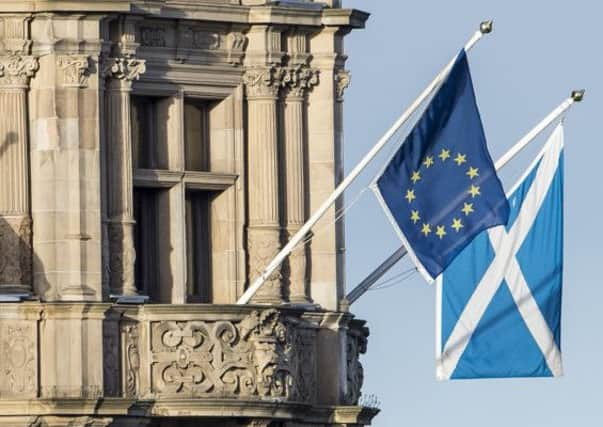John Curtice: EU issue far from decisive for Scots


It is an argument that rests on a shared assumption – that voters are sufficiently concerned about remaining in the EU that the issue might sway which way they will vote.
But the assumption is a dubious one. While more Scots want to stay in the EU than get out, there is far from widespread enthusiasm for the European project.
Advertisement
Hide AdAdvertisement
Hide AdThe most recent ICM poll for this paper found that while only a third said they would vote to get out if there were a EU referendum tomorrow, less than half (46 per cent) would vote to stay. One in five voters did not know what they would do. And as our graph shows, while most people might prefer to stay in the EU, no less than 40 per cent would like to see the EU’s powers reduced.
In those circumstances, appeals to vote either Yes or No on the grounds that to do so would be the best way of ensuring Scotland’s continued EU membership seem unlikely to have much resonance. Indeed, when the outgoing EU President Mr Barroso suggested in February that it would be difficult for Scotland to retain her EU membership following a Yes vote, just 3 per cent of Yes voters told Survation that his remarks made it more likely they would vote No. Equally, ICM have shown that just 4 per cent of No supporters say they would vote Yes if they thought that the UK was heading for the European exit. And in practice neither side has been particularly successful in winning the Europhile vote. While 51 per cent of Yes voters say they would vote to stay in the EU, so do 50 per cent of No voters. The referendum debate on the issue has raged to little or no discernible effect.
In contrast, Yes and No voters do hold somewhat different views about Britain’s nuclear weapons facility on the Clyde. Nevertheless, there is far from unanimity in either camp. On balance Yes supporters are opposed to the principle of Britain having nuclear weapons. According to the Scottish Social Attitudes survey, just 29 per cent are in favour while 58 per cent are opposed. In contrast No supporters are more or less evenly divided on the issue. While 43 per cent are in favour, 40 per cent are opposed.
But that means there is still many a voter who opposes nuclear weapons yet is still inclined to vote No. Indeed in the SSA survey, rather more opponents of nuclear weapons (46 per cent) indicated they would vote No, than said they would vote Yes (38 per cent).
So while, Scotland as a whole is on balance opposed to nuclear weapons – by 46 per cent to 37 per cent – the issue is not proving as big a vote winner for the Yes side as it might hope.
Indeed, the debate about defence and foreign affairs more generally is probably not the most fertile territory for the Yes campaign.
Ask Scots who should run any aspect of their country’s domestic affairs, and a majority will agree responsibility should lie with the Scottish Parliament. But on defence and foreign affairs, only 39 per cent nominate Holyrood, while 53 per cent reckon Westminster should remain be in charge.
Advertisement
Hide AdAdvertisement
Hide AdHaving responsibility for defence and foreign affairs is what above all distinguishes an independent state from a federal or devolved one. So this apparent reluctance to contemplate a Scots Army or Foreign Office could prove an important barrier to a Yes vote on 18 September.
• John Curtice is Professor of Politics, Strathclyde University